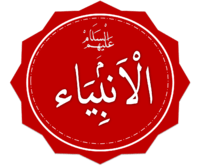Isaac in Islam
| Islamic prophet ʾIsḥāq إسحاق Isaac | |
|---|---|
| Resting place | Cave of the Patriarchs, Hebron |
| Other names | Hebrew name: יִצְחָק Yiṣḥāq |
| Children | Jacob, Esau |
| Parent(s) | Abraham and Sarah |
| Relatives | Grandfather of the Twelve Tribes of Israel, Half-brother of Ishmael |
Islamic Prophets |
|---|
 |
|
Listed by Islamic name and Biblical name. The six marked with a * are considered major prophets.
|
|
|
Isaac (Arabic: إسحاق or إسحٰق[note A] Isḥāq) is recognized as a patriarch, prophet and messenger of God by all Muslims.[1] In Islam, he is known as Isḥāq. As in Judaism and Christianity, Islam maintains that Isaac was the son of the patriarch and prophet Abraham from his wife Sarah. Muslims hold Isaac in deep veneration because they believe that both Isaac and his older half-brother Ishmael continued their father's spiritual legacy through their subsequent preaching of the message of God after the death of Abraham.[2] Isaac is mentioned in fifteen passages of the Qur'an.[3]
In the Qur'an
Isaac is mentioned fifteen times by name in the Qur'an, often with his father and his son, Yaʿqūb (Jacob).[4] The Qur'an states that Abraham received "good tidings of Isaac, a prophet, of the righteous", and that God blessed them both (XXXVII: 12). In a fuller description, when angels came to Ibrahim to tell him of the future punishment to be imposed on Sodom and Gomorrah, his wife, Sarah, "laughed, and We gave her good tidings of Isaac, and after Isaac of (a grandson) Jacob" (XI: 71-74); and it is further explained that this event will take place despite Abraham and Sarah's old age. Several verses speak of Isaac as a "gift" to Abraham (VI: 84; XIX: 49-50), and XXIX: 26-27 adds that God made "prophethood and the Book to be among his offspring", which has been interpreted to refer to Abraham's two prophetic sons, his prophetic grandson Jacob, and his prophetic great-grandson Joseph. In the Qur'an, it later narrates that Abraham also praised God for giving him Ishmael and Isaac in his old age (XIV: 39-41).
Elsewhere in the Qur'an, Isaac is mentioned in lists: Joseph follows the religion of his forefathers Abraham, Isaac and Jacob (XII: 38) and speaks of God's favor to them (XII: 6); Yaʿqūb's sons all testify their faith and promise to worship the God that their forefathers, "Abraham, Ishmael and Isaac", worshiped (II: 127); and the Qur'an commands Muslims to believe in the revelations that were given to "Abraham, Ishmael, Isaac, Jacob and the Patriarchs" (II: 136; III: 84). In the Qur'an's narrative of Abraham's near-sacrifice of his son (XXXVII: 102), the name of the son is not mentioned and debate has continued over the son's identity, though many feel that the identity is the least important element in a story which is given to show the courage that one develops through faith.[5]
Burial site

His tomb and that of his wife Rebekah is considered to be in the Cave of the Patriarchs in Hebron, known in Islam as the Ibrahim-i-Mosque ("Mosque of Abraham"). Alongside Isaac's cenotaph are the cenotaphs of some of the other Qur'anic/Biblical patriarchs and their wives: Abraham and Sarah and Jacob and Leah.
See also
- Biblical narratives and the Quran
- Legends and the Quran
- Muhammad in Islam
- Prophets of Islam
- Stories of The Prophets
Footnotes
- ^A إسحٰق (ʾIsḥāq) is the traditional Koranic spelling after vocalizing with a super script ʾalif. In Modern Standard Arabic, it is normally written إسحاق (ʾIsḥāq); IPA: /ʔisħaːq/.
Bibliography
- C.H. Becker, Islamstudien, i, 47
- ZDMG, xxxii, 359, ii
- Encyclopedia of Islam, W. M. Watt, Ishak
- Stories of the Prophets, Kisa'i; Ibn Kathir, The Story of Isaac and Jacob
References
| Wikimedia Commons has media related to Ishaq. |
- ↑ Lives of the Prophets, L. Azzam, Isaac and Jacob
- ↑ Stories of the Prophets, Kisa'i, Isaac
- ↑ Watt, W. Montgomery, “Isḥāḳ”, in: Encyclopaedia of Islam, Second Edition, Edited by: P. Bearman, Th. Bianquis, C.E. Bosworth, E. van Donzel, W.P. Heinrichs.
- ↑ Encyclopedia of Islam, W. Montgomery Watt, Isaac
- ↑ Concise Encyclopedia of Islam, C. Glasse, Isaac